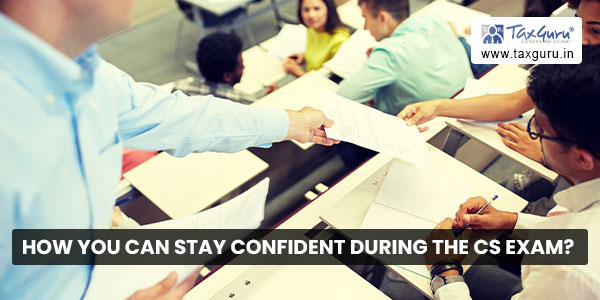It is said that achieving anything requires a combination of inspiration and perspiration. That means you have to work hard and be smart.
This philosophy applies to every good job as well as school or university exams.
For many students, the biggest problem with exams is a lack of confidence, or what some call ‘test anxiety.’
While it is of course important to know the contents of the exam, it is also important to put yourself in the right mental state to stand out and demonstrate your learning.
Page Contents
Few tips to stay confident at the time of exam:
1. Prepare yourself well:
As mentioned earlier, there is no substitute for good preparation. You need to study, pay attention to class, read material, and defend what you learn.
The best way to study is not to cram in hours or minutes before a test. In fact, studies have shown that people who study and then rest do better on exams than someone who treads twice as long and then walks straight to the exam.
How is that true? Scientists believe that one of the functions of sleep is to give your brain time to consolidate what it has learned throughout the day. Think of it like a filing system: when you’ve learned everything, just sit on the messy pile on your desk; your body stores them in permanent memory while you sleep.
That is, it is better to study for one hour five days in a row than to study five hours before a test
2. Write down what you think and learn:
Maybe you’ve heard from someone before that you only remember 10% of what you read and 20% of what you hear.
These numbers aren’t really backed up by research, but it’s true that people are more likely to remember more than what they did – that is, they remember something you did or taught more than anything you just read or listened to. This is one reason it is important to record what you have learned. When you take notes, your brain tends to record what you’ve learned and come back to it later.
Another great way to better remember what you’ve learned is to discuss it with someone. Study groups are ideal for this. When you talk about something, you not only generate more ideas, but you also relate them to what you already know, put them in context, and understand and remember them better.
So tell your parents or partner about the interesting information you are learning and you can actually consider it a part of your study time.
3. Assume a positive attitude:
And when you study and actually take the exam, attitude matters. A positive attitude keeps your mind open,relaxes your body, and makes it easier for you to focus and remember what you’ve learned.
However, sometimes it is difficult to stay positive, especially when exams are very important, when you are facing other challenges in life, when exams are a very difficult subject for you, or when you have very serious problems with exams. worry. In a situation like this, keeping yourself in a good mood isn’t easy.
Therefore, you should consider bulk 5-HTP supplements when you need additional beneficial effects. 5-HTP is a compound that the body naturally produces to work with serotonin to improve mood and induce feelings of happiness. This inexpensive supplement could be the key you need to maintain a positive attitude during a stressful exam time.
4. Drink more water & eat healthy food:
Of course, drinking enough water (6-8 glasses a day for most people) and eating a healthy diet, including lean meats, fresh fruits and vegetables, and whole grains, are important parts of keeping your body energized and strong needs.
And remember that when stress and exams cause you to not eat as well as you should, large amounts of vitamins may be all you need to keep your body balanced and ready to show it all.

5. Trust your preparation:
Sometimes the best way to reduce stress is not to talk about it, but to just relax and unwind.
This applies particularly to testing anxiety; It is important that you focus on your practice about an hour before the test. Instead of trampling on this fact at the last minute, trust that you’ve done your due diligence, researched what needs to be researched, and now take your time. Clear your head and then step into the test.
6. Do meditation:
Continuing on the schedule from the previous technique, we would like to remind ourselves that you too need to rest your mind and open it to more study.
So some of these short breaks can be in the form of relaxation, naps, meals, and other personal hygiene. But some have to think, perhaps through meditation. Say it’s 7 p.m., do some yoga or meditation. Then do the last lesson of the study before you go to sleep.
Above were the tips we had discussed that can help you in staying confident during exams.





